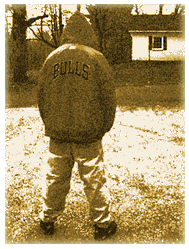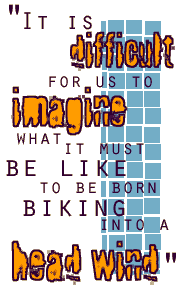POLITICS & COMMUNITY

by William "Upski" Wimsatt
April 30, 1996

The Oprah people were on the phone with my mom. Someone had given them my name as an expert on wiggers. You know, wiggers. White kids scorned by their peers for listening to rap. I was an expert on that.
My mother and I were glad to hear that I was an expert on something. My article on the topic had become the most responded to article in the history of hip-hop journalism. The Oprah guy was on the phone, trying to size me up.
Oh, I'm not trying to ridicule wiggers, I told him. Merely to describe them would accomplish this. I have little interest in ridicule for its own sake. The very things I hate the most about The Wigger: His stupid audacity and perverted desire (deeply held and deeply denied) to be down with black people -- these personality defects are a cause for celebration. If channeled in the right way, the Wigger can go a long way toward repairing the sickness of race in America.
The Oprah guy thought about this for a moment. We're trying to pick white hip-hop fans for the panel, he said. "How do you dress?"
How do I dress?

I didn't make the panel.
Remember the scene in Spike Lee's "Malcolm X," where Malcolm-soon-to-be-X's Muslim mentor asks if he has ever known a good white person (Malcolm thinks about it and he says he hasn't). Even a lot of whites who admire Malcolm X banished from their mind the implicit question: Would his answer have been any different had he known me ?
Look, none of us is born knowing the best way to live in a place as racially loaded as America -- let alone in the sub-society of hip-hop. I'm no great authority myself. But I have been around the block enough to pretty much know where the potholes are -- if only because I've fallen in them so many times.
My own thoughts about race started pretty naively. Not that anyone would have thought to ask, but for moments in my early life I must have been under the impression that black people ruled the Earth. I owed this inverted world view to two contradictory sources.
One of these was the fashionable University of Chicago Laboratory School where I was sent starting at age two. Although more than 60 percent white, and located in the whitest section of the Hyde Park neighborhood, "Lab School" and its immediate community are a demographic blip in the middle of Chicago's South Side, the largest and most populous black settlement in North America.
Minutes away are Pill Hill, The Gap, Prairie Shores, Chatham, Kenwood, Beverly, South Shore, and other enclaves of black prosperity where the likes of Muhammad Ali, Louis Farrakhan, Gwendolyn Brooks, Jesse Jackson, Carol Mosely Braun, R. Kelly, and Rashied Lynn (AKA Common Sense) have made their homes.
The Johnson Publishing family, the Burrell Advertising family, and U of C sociologist William Julius Wilson all sent their kids to Lab School. The 1993 keynote speaker for Black History Month was Betty Shabazz (Malcolm X's widow), a close personal friend of one of the parents. Are you getting the picture? Many of the first blacks I encountered were richer than I was. One of the boys seemed to come to school wearing an expensive new pair of shoes every other week -- in the third grade!

In the family car, we would sometimes have to drive through the ghetto -- or past it if possible. God forbid our car should get stuck. From the back seat I would peer out on the fobidding world beyond the boundaries of 47th Street, 61st Street, and Cottage Grove, fantasizing about what anarchy presided there amid the wrecked and neglected buildings.
James T. Farrell's short story "The Fastest Runner on 61st Street," written back when 61st was white, tells of a white boy gang from 61st Street spotting a black boy who had strayed across Washington Park. A chase ensues, and when the fastest of the gang crosses 51st Street into the black neighborhood he is killed instantly -- within a block. In the logic of white Hyde Park, this was the only plausible result.
And in the summertime especially, the ghetto would drive, walk, bus and bike through Hyde Park (if they were riding double, it meant they were planning to steal yours), in search of the museum, the beach, the theater, and the affluent aura. I still remember the first time I saw a white person walking in the ghetto. "Look, look, I saw a white lady," I shouted from the back seat. "She's probably a prostitute," my mom responded.
My early experience with race was more immediate than that of most whites, but the patterns were about the same. Blacks most likely to enter our world tend to be the socioeconomic extremes rather than the vast middle. Between the assimilated blacks I met at school and the aggressive ones I avoided on the street, it became easy to imagine that the blacks were the ones who had it good in America. This is more than just a harmless childhood fantasy of mine. It is a common, if usually unspoken, belief among whites.

Nevertheless, it was their veneer of power, rather than their underlying powerlessness that attracted me to blacks. I was drawn by admiration rather than pity -- this is what separates the white rap fan from the white missionary. I had always had delinquent tendencies, and who could symbolize my wild side better than the bands of boisterous black boys who I and everyone I knew feared? Newspaper columnist Mike Royko once compared housing projects to beehives. Like a lot of boys, I would kill bees, and throw rocks at their hives -- not because they had stung me, but because my fear of them became an excuse to unleash my own violence. I felt the same way about blacks in the ghetto. It's lucky I was raised by liberals! I might very well have tried to kill them.
William "Upski" Wimsatt is the author of "Bomb the Suburbs," a collection containing this and other essays. To order a copy send seven dollars to The Subway and Elevated Press Co., PO Box 377653, Chicago, IL 60637.
